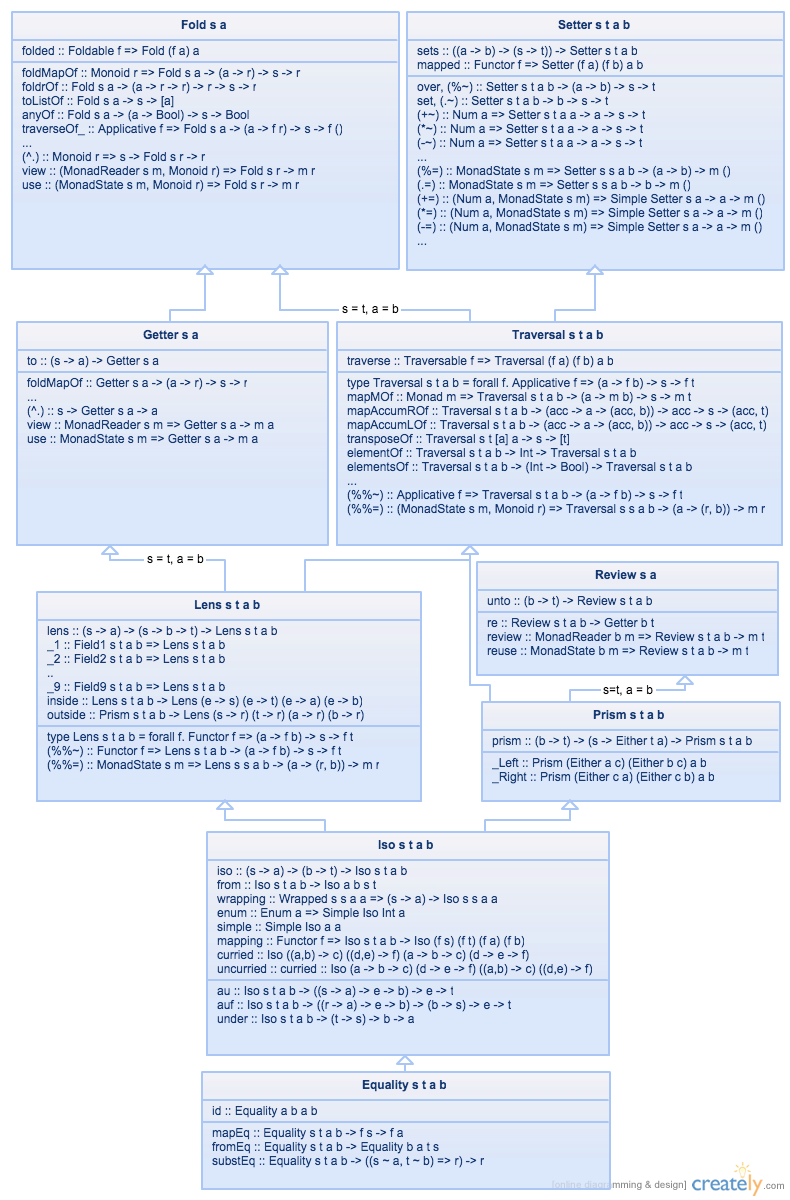Lens: Lenses, Folds, and Traversals
This package provides families of lenses, isomorphisms, folds, traversals, getters and setters.
If you are looking for where to get started, a crash course video on how lens was constructed and how to use the basics is available on youtube. It is best watched in high definition to see the slides, but the slides are also available if you want to use them to follow along.
The FAQ, which provides links to a large number of different resources for learning about lenses and an overview of the derivation of these types can be found on the Lens Wiki along with a brief overview and some examples.
Documentation is available through github (for HEAD) or hackage for the current and preceding releases.
Field Guide
Examples
(See wiki/Examples)
First, import Control.Lens.
ghci> import Control.LensNow, you can read from lenses
ghci> ("hello","world")^._2
"world"and you can write to lenses.
ghci> set _2 42 ("hello","world")
("hello",42)Composing lenses for reading (or writing) goes in the order an imperative programmer would expect, and just uses (.) from the Prelude.
ghci> ("hello",("world","!!!"))^._2._1
"world"ghci> set (_2._1) 42 ("hello",("world","!!!"))
("hello",(42,"!!!"))You can make a Getter out of a pure function with to.
ghci> "hello"^.to length
5You can easily compose a Getter with a Lens just using (.). No explicit coercion is necessary.
ghci> ("hello",("world","!!!"))^._2._2.to length
3As we saw above, you can write to lenses and these writes can change the type of the container. (.~) is an infix alias for set.
ghci> _1 .~ "hello" $ ((),"world")
("hello","world")Conversely view, can be used as a prefix alias for (^.).
ghci> view _2 (10,20)
20There are a large number of other lens variants provided by the library, in particular a Traversal generalizes traverse from Data.Traversable.
We'll come back to those later, but continuing with just lenses:
You can let the library automatically derive lenses for fields of your data type
data Foo a = Foo { _bar :: Int, _baz :: Int, _quux :: a }
makeLenses ''FooThis will automatically generate the following lenses:
bar, baz :: Lens' (Foo a) Int
quux :: Lens (Foo a) (Foo b) a bA Lens takes 4 parameters because it can change the types of the whole when you change the type of the part.
Often you won't need this flexibility, a Lens' takes 2 parameters, and can be used directly as a Lens.
You can also write to setters that target multiple parts of a structure, or their composition with other lenses or setters. The canonical example of a setter is 'mapped':
mapped :: Functor f => Setter (f a) (f b) a bover is then analogous to fmap, but parameterized on the Setter.
ghci> fmap succ [1,2,3]
[2,3,4]
ghci> over mapped succ [1,2,3]
[2,3,4]The benefit is that you can use any Lens as a Setter, and the composition of setters with other setters or lenses using (.) yields
a Setter.
ghci> over (mapped._2) succ [(1,2),(3,4)]
[(1,3),(3,5)](%~) is an infix alias for 'over', and the precedence lets you avoid swimming in parentheses:
ghci> _1.mapped._2.mapped %~ succ $ ([(42, "hello")],"world")
([(42, "ifmmp")],"world")There are a number of combinators that resemble the +=, *=, etc. operators from C/C++ for working with the monad transformers.
There are +~, *~, etc. analogues to those combinators that work functionally, returning the modified version of the structure.
ghci> both *~ 2 $ (1,2)
(2,4)There are combinators for manipulating the current state in a state monad as well
fresh :: MonadState Int m => m Int
fresh = id <+= 1Anything you know how to do with a Foldable container, you can do with a Fold
ghci> :m + Data.Char Data.Text.Lens
ghci> allOf (folded.text) isLower ["hello"^.packed, "goodbye"^.packed]
TrueYou can also use this for generic programming. Combinators are included that are based on Neil Mitchell's uniplate, but which
have been generalized to work on or as lenses, folds, and traversals.
ghci> :m + Data.Data.Lens
ghci> anyOf biplate (=="world") ("hello",(),[(2::Int,"world")])
TrueAs alluded to above, anything you know how to do with a Traversable you can do with a Traversal.
ghci> mapMOf (traverse._2) (\xs -> length xs <$ putStrLn xs) [(42,"hello"),(56,"world")]
"hello"
"world"
[(42,5),(56,5)]Moreover, many of the lenses supplied are actually isomorphisms, that means you can use them directly as a lens or getter:
ghci> let hello = "hello"^.packed
"hello"
ghci> :t hello
hello :: Textbut you can also flip them around and use them as a lens the other way with from!
ghci> hello^.from packed.to length
5You can automatically derive isomorphisms for your own newtypes with makePrisms. e.g.
newtype Neither a b = Neither { _nor :: Either a b } deriving (Show)
makePrisms ''Neitherwill automatically derive
_Neither :: Iso (Neither a b) (Neither c d) (Either a b) (Either c d)such that
_Neither.from _Neither = id
from _Neither._Neither = idAlternatively, you can use makeLenses to automatically derive isomorphisms for your own newtypes. e.g..
makeLenses ''Neitherwill automatically derive
nor :: Iso (Either a b) (Either c d) (Neither a b) (Neither c d)which behaves identically to _Neither above.
There is also a fully operational, but simple game of Pong in the examples/ folder.
There are also a couple of hundred examples distributed throughout the haddock documentation.
Contact Information
Contributions and bug reports are welcome!
Please feel free to contact me through GitHub or on the #haskell-lens or #haskell IRC channel on Libera Chat.
-Edward Kmett


